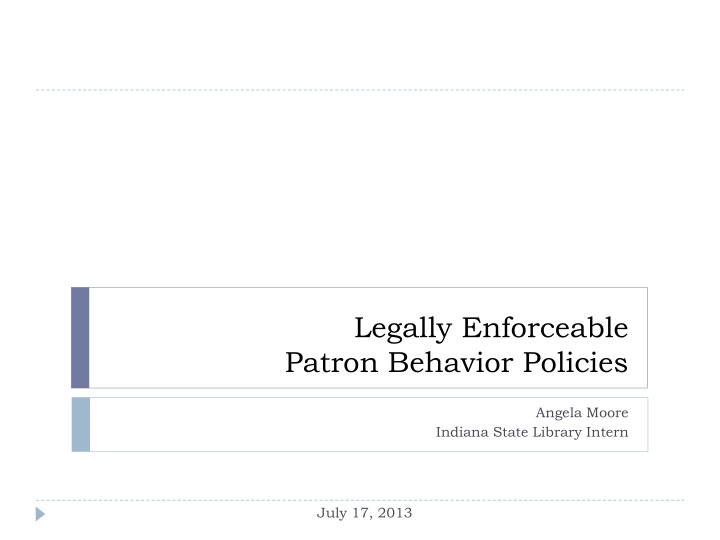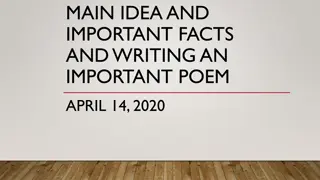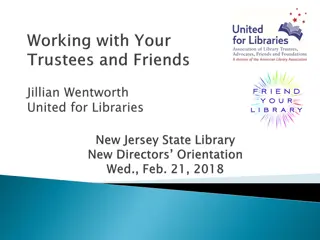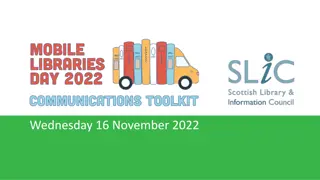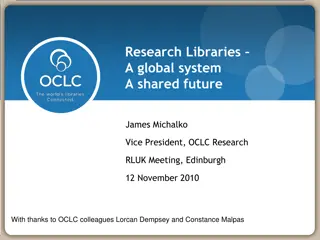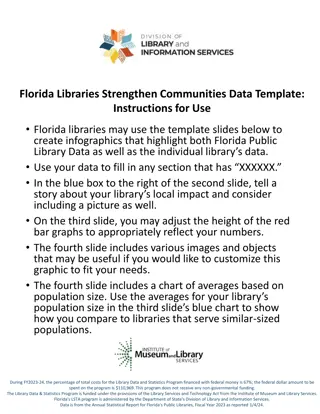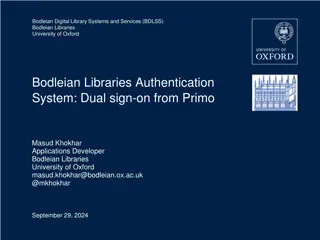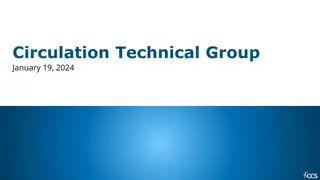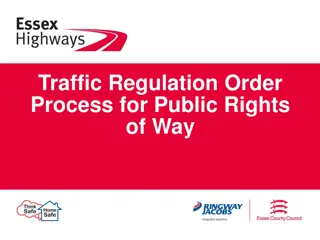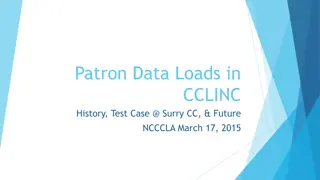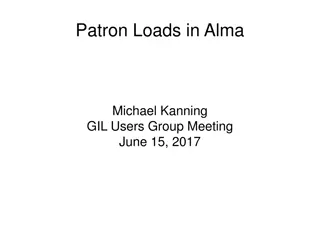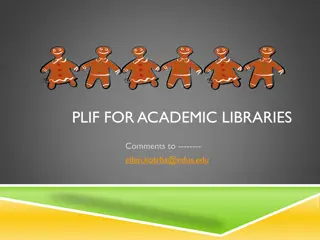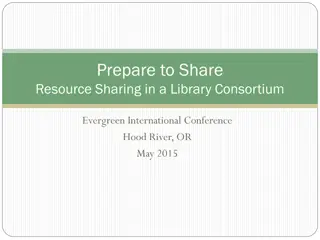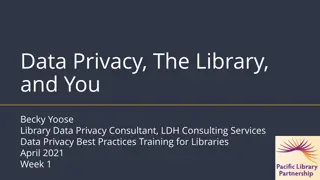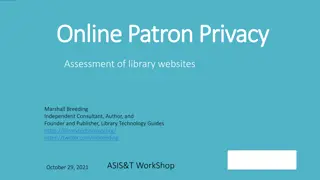Legal Regulation of Patron Behavior in Public Libraries
Explore the legal framework governing the enforcement of patron behavior policies in public libraries. Learn about the regulations concerning behavior, conditions to enter the library, speech, illegal activities, and more. Understand the legal criteria, First Amendment implications, and real-life cases that shape the boundaries of library regulations.
Download Presentation

Please find below an Image/Link to download the presentation.
The content on the website is provided AS IS for your information and personal use only. It may not be sold, licensed, or shared on other websites without obtaining consent from the author.If you encounter any issues during the download, it is possible that the publisher has removed the file from their server.
You are allowed to download the files provided on this website for personal or commercial use, subject to the condition that they are used lawfully. All files are the property of their respective owners.
The content on the website is provided AS IS for your information and personal use only. It may not be sold, licensed, or shared on other websites without obtaining consent from the author.
E N D
Presentation Transcript
Legally Enforceable Patron Behavior Policies Angela Moore Indiana State Library Intern July 17, 2013
Presenter Introduction Rising 2nd year law student Not a lawyer Summer legal intern at ISL Former librarian at Berne Public Library 2
Disclaimer This is legal information, not legal advice I cannot apply the law to your specific situation 3
Overview Matter What can we regulate? First Amendment protection Manner Equal Enforcement Patron Notice Appeals Process Reasonable Penalties Laws limiting libraries ability to regulate 4
Matter of Regulation What are you regulating? 5
What are you regulating? Behavior Conditions to enter library (e.g. hygiene) Speech Illegal Activity 6
What are you regulating? Behavior Examples: Patrons shall be engaged in activities associated with the use of a public library while in the building. Patrons not engaged in reading, studying, or using library materials shall be required to leave the building. Kreimer v. Bureau of Police, 958 F.2d 1242 (3d Cir. 1992) No eating in carpeted areas No running in the library building Legal criteria: 1. Must be reasonable 2. Must be related to library s mission 7
What are you regulating? Conditions patrons must conform to in order to be allowed in the library e.g. Hygiene regulations/patron dress code If you don t wear shoes you can t come in 1st Amendment right to receive information Connected to freedoms of press, speech Legal criteria: 1. Serve significant government interest 2. Narrowly-tailored 3. Ample alternative channels to receive information 8
Case: Doe v. City of Albuquerque Sex-offenders banned from library Interferes with 1st Amendment right to receive information Library lost On procedural grounds (?) Library has significant interest in providing a safe environment for its library patrons, especially children. Would need to show narrow-tailoring & alternative channels for those banned to receive information Maybe ok to limit hours 9 Doe v. City of Albuquerque, 667 F.3d 1111 (10th Cir. 2012)
What are you regulating? Speech Be careful Content-neutral regulations only Limit by time, manner (e.g. volume), or place 1. Significant government interest 2. Narrowly-tailored 3. Ample alternative channels to receive information Exceptions: Child pornography Obscenity, defined in IC 35-49-2-1( pornography) Harmful to minors For meeting room policies, see webinar www.in.gov/library/law.htm 10
What are you regulating? Illegal Activity You don t even need to put it in your policy But you may, and you may want to Examples: Smoking Fighting: Bryant v. State, 2009 Ind. App. Unpub. LEXIS 821 (Ind. Ct. App. Mar. 16, 2009) Public indecency: Glotzbach v. State, 783 N.E.2d 1221 (Ind. Ct. App. 2003) Public indecency law: IC 35-45-4-1 11
What are you regulating? Behavior Reasonable + related to library s mission Conditions to enter library (e.g. hygiene) Narrowly-tailored, significant government interest, alternative channels Content-neutral speech (time, manner, place) Narrowly-tailored, significant government interest, alternative channels Content-driven speech Don t do it protected by 1st Amendment Illegal Activity Doesn t need to be in your policy 12
Manner of Regulation: Equal Enforcement, Patron Notice, Appeals, and Reasonable Penalties 13
Manner of Regulation Equal Enforcement Patron Notice Appeals Process Reasonable Penalties 14
Equal Enforcement & Patron Notice Equal Enforcement Be consistent Treat teenagers the same as board members. Policies/instructions clearly worded Don t leave it to each employee to interpret the policy Patron Notice Patrons should know how to be compliant Post/hand out policies Policies clearly worded Tip: Write down your policies! 15
Equal Enforcement & Patron Notice Avoid vagueness and overbreadth Vagueness means the language of the policy leaves too much open to interpretation e.g. Do not bother other patrons Talking? Tapping pencil? Standing too close? Overbreadth prohibits too much legitimate conduct e.g. only patrons reading a book can remain in library Reading newspaper, looking for a book, asking reference question, attending a program 16
Case: Brinkmeier v. Freeport Patron removed from library under policy to preclude any person who harasses and/or intimidates other library patrons or employees An unwritten policy Library lost Lacks reasonable boundaries What if patron harasses other patron off library grounds? Definition of harass? All forms of harassment lead to ban Precluded from library for how long? Take-away: put your policies in writing! 17 Brinkmeier v. Freeport, 1993 U.S. Dist. LEXIS 9255 (N.D. Ill. July 2, 1993)
Case: Kreimer v. Bureau of Police Behavior: Patrons shall respect the rights of other patrons and shall not harass or annoy others through noisy or boisterous activities, by staring at another person with the intent to annoy that person, by following another person about the building with the intent to annoy that person, by playing audio equipment so that others can hear it, by singing or talking to others or in monologues, or by behaving in a manner which reasonably can be expected to disturb other persons. Library won Reasonable, related to library s mission reasonably can be expected to disturb Not catering to individual patron sensitivities 18 Kreimer v. Bureau of Police, 958 F.2d 1242 (3d Cir. 1992)
Case: Kreimer v. Bureau of Police Hygiene/dress code Patrons shall not be permitted to enter the building without a shirt or other covering of their upper bodies or without shoes or other footwear. Patrons whose bodily hygiene is offensive so as to constitute a nuisance to other persons shall be required to leave the building. Library won Nuisance has a legal meaning Library has significant government interest in protecting allpatrons right to receive information 19 Kreimer v. Bureau of Police, 958 F.2d 1242 (3d Cir. 1992)
Case: Armstrong v. D.C. Public Library Homeless man not allowed to enter library due to objectionable appearance 1st Amendment implicated Library lost Patrons denied entrance if appearance is objectionable (barefooted, bare-chested, body odor, filthy clothing, etc.) Objectionable has no legal definition etc. is too open to individual interpretation Guards given no guidance for enforcement 20 Armstrong v. D.C. Pub. Library, 154 F. Supp. 2d 67 (D.D.C. 2001)
Equal Enforcement & Patron Notice Bad policy language: Language that depends on interpretation Does not give patrons notice of what is allowed Individual employees will enforce differently Policies without reasonable boundaries Examples: etc. includes but is not limited to objectionable or offensive (without definition) 21
Equal Enforcement & Patron Notice Good policy language: nuisance or other words with legal meaning IN nuisance law: IC 32-30-6-6 Injurious to health, indecent, offensive to the senses, or an obstruction to the free use of property so as essentially to interfere with the comfortable enjoyment of life or property Behavior that can reasonably be expected to have a particular result 22
Appeals & Reasonable Penalties Appeals As feasible More severe penalties, require tougher appeal process Doesn t need formal court process (e.g. jury of peers) Reasonable Penalties Barring people from the library implicates 1st Amendment right to receive information No lifetime bans for first-time minor infractions Ok to increase penalty for repeated infractions 6-mo. ban for offensive note to another patron ok because he interfered with her right to use library Tronsen v. Toledo-Lucas County Public Library, 2008 U.S. Dist. LEXIS 20359 (N.D. Ohio, June 30, 2008) Good to have in writing 23
Case: Grigsby v. City of Oakland Patron told to leave children s room after staring at young woman and children Two days later, patron returns, has confrontation with security guard, police make him leave library Patron brings due process claim, says he should have been allowed an appeal before eviction Library wins for two reasons: 1. Intrusion on patron s rights was minimal (a few hours) 2. No legal reason why appeal must be before eviction 24 Grigsby v. City of Oakland, 2002 U.S. Dist. LEXIS 10621 (N.D. Cal. June 10, 2002)
Case: Doyle v. Clark County Pub. Library Patron barred for two years after following, staring at, and harassing another patron Patron given right to appeal with legal counsel to library director Patron says he should have been given: 1. Chance to confront accuser 2. Trial by jury Library wins, because those rights do not apply to library discipline hearings 25 Doyle v. Clark County Pub. Library, 2007 U.S. Dist. LEXIS 102629 (S.D. Ohio July 3, 2007)
Case: Neinast v. Columbus Met. Library Barefoot advocate given one-day eviction after multiple warnings to wear shoes in library Library won Gov t interest: patron safety/library economic health Alternative channels: wear shoes Eviction procedure explained to patron, patron given chance to tell his side 26 Neinast v. Bd. of Trs. of the Columbus Metro. Library, 346 F.3d 585 (6th Cir. 2003)
Sample Language To provide notice on a patron behavior policy 1. Violators will receive a warning and an opportunity to cease. 2. Repeat violations may result in suspension of Library privileges. 3. Appeal requests may be made in writing to the Library Director. 4. Further appeals may be made to the Library Board. 27 From Mary Minow s presentation: Writing a Patron Behavior Code (funded in part by IMLS through LSTA), available at: http://infopeople.org/training/writing-library-behavior-code
Appeals & Reasonable Penalties Bigger punishment = more rigorous appeals process Appeals are not court hearings Penalties: ok to consider Repeat infractions Effects on other patrons right to receive information Write out a penalty table/matrix/chart la this table of army penalties 28
Specific Laws Limiting Regulations 29
Limiting Laws Service Animals Americans with Disabilities Act Breastfeeding IC 16-35-6-1 Firearms IC 35-47-11.1 30
Service Animals Service dogs must be allowed w/two exceptions: 1. Animal is out of control 2. Animal is not housebroken Patron must be allowed to remain without animal DO NOT ask about disability or certification May ask: 1. If animal is required because of a disability 2. What tasks the animal is trained to perform Code of Federal Regulations: 28 CFR 35.136 See ADA webinar: www.in.gov/library/law.htm 31
Breastfeeding It s behavior, however: IC 16-35-6-1 Notwithstanding any other law, a woman may breastfeed her child anywhere the woman has a right to be. 32
Firearms - IC 35-47-11.1 In general: A public library cannot regulate the carrying of firearms, ammunition, or firearm accessories Cannot create new policy Old policies are void Exceptions: Can create policy prohibiting/restricting intentional displays of firearms at library s public meetings Can prohibit on-duty employees from carrying firearms or having in plain sight on library grounds Cannot prohibit out of view storage in locked car 33
Firearms - IC 35-47-11.1 Legal alternatives to restricting firearms Regulate behavior Patrons shall not utilize library property or other property that has been brought into the library in a manner that creates a safety hazard for library patrons. Patrons shall respect the rights of other patrons and shall not harass, annoy, or intimidate others through noisy, boisterous, or threatening activities; or by behaving in any other manner which reasonably can be expected to disturb other persons. Manner of regulation requirements still apply Read it for yourself: IC 35-47-11.1 http://www.in.gov/library/files/2011_Legislation_-_SEA_292_Firearms_-_Analysis_and_Guidance.docx 34
Summary Regulate behavior or hygiene; only use time, manner, or place restrictions on speech Enforce equally Don t leave it to individual employees to interpret Provide notice Clear language, post policies Appeals process As feasible Reasonable penalties Law prevents you from regulating some activity 35
Resources ALA Guidelines for the Development of Policies and Procedures Regarding User Behavior and Library Usage Michigan State Library s Four Tests for a Legally-Enforceable Library Policy 36
Questions For questions about this presentation, contact: Angela Moore: mangela@library.in.gov At ISL until July 31st For questions about specific regulations at your library, contact your library s attorney. 37
